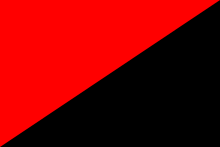Raoul Vaneigem
Raoul Vaneigem (Dutch pronunciation: [raːˈul vɑnˈɛi̯ɣəm]; born 21 March 1934) is a Belgian writer known for his 1967 book The Revolution of Everyday Life.
Raoul Vaneigem | |
|---|---|
| Born | 21 March 1934 |
He was born in Lessines (Hainaut, Belgium) and studied romance philology at the Free University of Brussels (now split into the Université Libre de Bruxelles and the Vrije Universiteit Brussel) from 1952 to 1956. He was a member of the Situationist International from 1961 to 1970.[1] He currently resides in Belgium and is the father of four children.
Biography
Vaneigem and Guy Debord were two of the principal theorists of the Situationist movement. Vaneigem's slogans frequently made it onto the walls of Paris during the May 1968 uprisings. His most famous book, and the one that contains the most famous slogans, is The Revolution of Everyday Life (in French Traité de savoir-vivre à l'usage des jeunes générations). In it, he challenged what he called "passive nihilism", a passive acceptance of the absurdities of modernism which he considered "an overture to conformism".[2]
According to the website nothingness.org,
The voice of Raoul Vaneigem was one of the strongest of the Situationists. Counterpoised to Guy Debord's political and polemic style, Vaneigem offered a more poetic and spirited prose. The Revolution of Everyday Life (Traité de savoir-vivre à l'usage des jeunes générations), published in the same year as [Debord's] The Society of the Spectacle, helped broaden and balance the presentation of the SI's theories and practices. One of the longest SI members, and frequent editor of the journal Internationale Situationniste, Vaneigem finally left the SI in November 1970, citing their failures as well as his own in his letter of resignation. Soon after, Debord issued a typically scathing response denouncing both Vaneigem and his critique of the Situationist International.[3]
After leaving the Situationist International, Vaneigem wrote a series of polemical books defending the idea of a free and self-regulating social order. He frequently made use of pseudonyms, including "Ratgeb", "Julienne de Cherisy," "Robert Desessarts," "Jules-François Dupuis," "Tristan Hannaniel," "Anne de Launay," and "Michel Thorgal." Recently he has been an advocate of a new type of strike, in which service and transportation workers provide services for free and refuse to collect payment or fares.
In 2009 Vaneigem was interviewed by Hans Ulrich Obrist for e-flux.[4]
Partial bibliography
- The Revolution of Everyday Life (Traité de savoir-vivre à l'usage des jeunes générations)
- Traité de savoir-vivre à l'usage des jeunes générations
- Le livre des plaisirs (The Book of Pleasures), 1979, reprinted 1993.
- L'Ile aux delices (The Island of Delights), an erotic novel, 1979.
- Le mouvement du libre-esprit (The Movement of the Free Spirit), 1986.
- Adresse aux vivants sur la mort qui les gouverne et l'opportunité de s'en défaire, 1990
- Lettre de Staline à ses enfants enfin réconciliés de l'Est et de l'Ouest, 1992
- La résistance au christianisme. Les hérésies des origines au XVIIIe siècle, 1993
- Les hérésies, 1994
- Avertissement aux écoliers et lycéens, 1995
- Nous qui désirons sans fin, 1996
- La Paresse, 1996
- Notes sans portée, 1997
- Dictionnaire de citations pour servir au divertissement et à l'intelligence du temps, 1998
- Déclaration des droits de l'être humain. De la souveraineté de la vie comme dépassement des droits de le l'homme, 2001
- Pour une internationale du genre humain, 2001
- Salut à Rabelais ! Une lecture au présent, 2003
- Rien n'est sacré, tout peut se dire. Réflexions sur la liberté d'expression, 2003
- Le Chevalier, la Dame, le Diable et la Mort, 2003
- Modestes propositions aux grévistes, 2004
- Journal imaginaire, 2005
References
- "Raoul Vaneigem". www.notbored.org. Retrieved 2017-03-21.
- S. Critchley (2004), Very Little... Almost Nothing. p. 13.
- www.nothingness.org, which also has additional biographical material. See also www.notbored.org.
- In Conversation with Raoul Vaneigem Archived 2009-09-07 at the Wayback Machine accessed 8 August 2009
Further reading
- In French
- CHARLES (Pol), Vaneigem l'insatiable, L'Age d'Homme, Lausanne, Suisse, 2002, ISBN 2-8251-1647-5
- LAMBRETTE (Grégory), Raoul Vaneigem, St-Georges d'Oléron-Bruxelles, Editions Libertaires/Editions d'Alternative Libertaire, coll. Graine d'ananar, 2002
- SIX (Laurent), Raoul Vaneigem. L'éloge de la vie affinée, Avin, Luce Wilquin, coll. L'Oeuvre en Lumière, 2004
- ADAM (Christian), « Oublier Vaneigem » (pp. 5–83), in Résignez-vous !, Edilivre, Paris, 2015 (very critical pamphlet against Vaneigem's optimism).
External links
- English and French texts on nothingness.org library
- 24+ French and German texts availed as part of the Smirkers-of-the-World.org Translinguistics project
- English texts availed as part of the Lust-for-Life.org open library project
- Vaneigem archive at Libcom.org
- The Decline and Fall of Work free mp3 recording of Vaneigem's essay of the same name, from the Audio Anarchy project
- Raoul Vaneigem Papers. General Collection, Beinecke Rare Book and Manuscript Library, Yale University.
